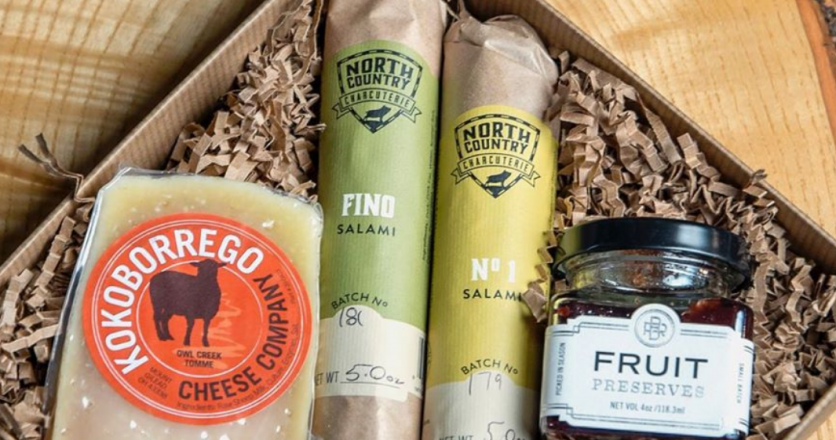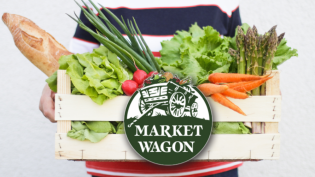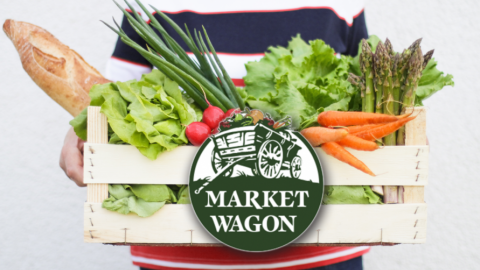Not a Return to Mayberry
There’s one thing Nick Carter wants you to know about his business Market Wagon, an online grocery service bringing the farmers market to your doorstep: it’s not a return to Mayberry.
Though the e-commerce platform shifts the focus back from big grocery chains to local farmers, producers and artisans, Carter says it’s anything but clinging to old traditions.
“This isn’t going backwards, it’s going forwards,” says Carter. “And it’s preserving what’s most important in our society.”
Founded in Indianapolis in 2016 by Carter and Dan Brunner, Market Wagon is one of the foremost ways for people to shop online for local food products across Indiana, Ohio and Kentucky. Shoppers can visit the website to pick out items from farmers, producers and makers within their community to be delivered straight to their door.
What separates them from other online grocery websites is their packaging system, wherein vendors gather weekly in designated locations across the Midwest to fulfill orders placed by shoppers online. From there, each order is delivered to each home on the same day.
Carter says the logistics behind their distribution were designed from the beginning to service the entire Midwest and create a brand new system for food supply.
“We started this company with this really lofty, grandiose goal to build a new supply chain for local food,” says Carter. “We had never built anything like this and it was going to be a little boutique business.”
Having grown up on Honey Creek Farm in Rushville, Indiana, Carter understands more than most how difficult it can be for modern farmers and artisans. There’s a “get big or get out” mantra that farmers live by, and long before there was e-commerce, Honey Creek just couldn’t get big enough.
Carter says the farming community is much more high stakes than others because of the pressure to maintain a legacy passed down through decades.
“Farming is one of those last professions that exists and gets passed down from generation to generation,” says Carter. “If you’re a farmer and you lose the business, then you’ve lost it for your entire family and everyone that comes after you.”
Carter left home to embark on a career in tech startups, realizing along the way that if he wanted to help his family’s farm, he would have to make a cataclysmic change in the Midwest’s entire food supply industry. Then in 2016, he met Brunner, who had the engineering background and analytical skills necessary to make this change a reality.
Though the idea might’ve been laughable to some people at first, Market Wagon has grown to help over 300 farms across the Midwest, including that of Carter’s family.
“I have memories of listening to mom and dad figure out how to buy groceries and pay the bills,” says Carter. “To be able to prevent that from happening to other family farms is just an overwhelming joy.”
Market Wagon was designed from the beginning to withstand the weight of the entire region’s food demands, but there was no telling how it would fare against an overnight surge in both vendors and customers. That is, not until a pandemic threatened the entire country’s food supply chain, leaving farmers, producers and makers with even less ways to sell their products than before.
While big chain stores and other online grocers struggled to keep up with the demands of worried shoppers, Carter says Market Wagon’s system went on without a single hiccup. In fact, the business expanded by 600% in the last two weeks of March alone from vendors, suddenly unable to sell their products in-person, flocking to the website.
“It was humbling to see we were in the right place at the right time to help farmers, artisans and producers who desperately needed that help,” says Carter. “I’m just glad that we were there.”
Though Market Wagon fulfills a need for farmers and artisans to maintain their businesses in the 21st century, it’s about much more than just sales. More than ever, the public is becoming educated on the importance of knowing where your food is actually from. Carter says Market Wagon is bringing this education to the local communities by giving people and food makers a platform to interact, a place to get to know each other.
“Relationships are the fabric of our society,” says Carter. “People on Market Wagon are buying from individuals, farmers that they can know. You’re not buying from a faceless, nameless sticker on a package.”
To shop for fruit, vegetables, eggs, meats, pastries, snack mixes, sauces, cocktails, coffee, spices, pet food, soaps, oils and more from local farmers and artisans across the Midwest, check out what’s available in your area at MarketWagon.com. Or, to learn how you can sell your own products on Market Wagon, visit their vendor portal.








